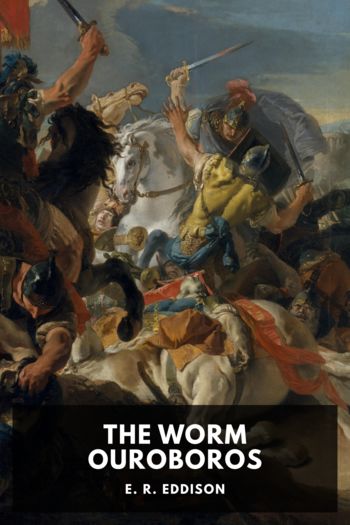Jurgen by James Branch Cabell (any book recommendations TXT) 📕

- Author: James Branch Cabell
Book online «Jurgen by James Branch Cabell (any book recommendations TXT) 📕». Author James Branch Cabell
“Oh, yes,” they said. “You must not think that we of Glathion are quite shut out from the great world. We have heard of all these affairs. And we have also heard fine things of your duchy of Logreus, messire.”
“Doubtless,” said Jurgen; and turned again to his singing.
“Lo, for I pray to thee, resistless Love,” he descanted, “that thou today make cry unto my love, to Phyllida whom I, poor Logreus, love so tenderly, not to deny me love! Asked why, say thou my drink and food is love, in days wherein I think and brood on love, and truly find naught good in aught save love, since Phyllida hath taught me how to love.”
Here Jurgen groaned with nicely modulated ardor; and he continued: “If she avow such constant hate of love as would ignore my great and constant love, plead thou no more! With listless lore of love woo Death resistlessly, resistless Love, in place of her that saith such scorn of love as lends to Death the lure and grace I love.”
Thus Jurgen sang melodiously of his Phyllida, and meant thereby (as everybody knew) the Princess Guenevere. Since custom compelled him to deal in analogues, he dealt wholesale. Gems and metals, the blossoms of the field and garden, fires and wounds and sunrises and perfumes, an armory of lethal weapons, ice and a concourse of mythological deities were his starting-point. Then the seas and heavens were dredged of phenomena to be mentioned with disparagement, in comparison with one or another feature of Duke Jurgen’s Phyllida. Zoology and history, and generally the remembered contents of his pawnshop, were overhauled and made to furnish targets for depreciation: whereas in dealing with the famous ladies loved by earlier poets, Duke Jurgen was positively insulting, allowing hardly a rag of merit. Still, he was careful to be just: and he allowed that these poor creatures might figure advantageously enough in eyes which had never beheld his Phyllida. And to all this information the lady whom he hymned attended willingly.
“She is a princess,” reflected Jurgen. “She is quite beautiful. She is young, and whatever her father’s opinion, she is reasonably intelligent, as women go. Nobody could ask more. Why, then, am I not out of my head about her? Already she permits a kiss or two when nobody is around, and presently she will permit more. And she thinks I am quite the cleverest person living. Come, Jurgen, man! is there no heart in this spry young body you have regained? Come, let us have a little honest rapture and excitement over this promising situation!”
But somehow Jurgen could not manage it. He was interested in what, he knew, was going to happen. Yes, undoubtedly he looked forward to more intimate converse with this beautiful young princess, but it was rather as one anticipates partaking of a favorite dessert. Jurgen felt that a liaison arranged for in this spirit was neither one thing or the other.
“If only I could feel like a cold-blooded villain, now, I would at worst be classifiable. But I intend the girl no harm, I am honestly fond of her. I shall talk my best, broaden her ideas, and give her, I flatter myself, considerable pleasure: vulgar prejudices apart, I shall leave her no whit the worse. Why, the dear little thing, not for the ransom of seven emperors would I do her any hurt! And in these matters discretion is everything, simply everything. No, quite decidedly, I am not a cold-blooded villain; and I shall deal fairly with the Princess.”
Thus Jurgen was disappointed by his own emotions, as he turned them from side to side, and prodded them, and shifted to a fresh viewpoint, only to find it no more favorable than the one relinquished: but he veiled the inadequacy of his emotions with very moving fervors. The tale does not record his conversations with Guenevere: for Jurgen now discoursed plain idiocy, as one purveys sweetmeats to a child in fond astonishment at the pet’s appetite. And leisurely Jurgen advanced: there was no hurry, with weeks wherein to accomplish everything: meanwhile this routine work had a familiar pleasantness.
For the amateur coordinates matters, knowing that one thing axiomatically leads to another. There is no harm at all in respectful allusions to a love that comprehends its hopelessness: it was merely a fact which Jurgen mentioned, and was about to pass on; only Guenevere, in modesty, was forced to disparage her own attractions, as an inadequate cause for so much misery. Common courtesy demanded that Jurgen enter upon a rebuttal. To emphasize one point in this, the orator was forced to take the hand of his audience: but strangers did that every day, with nobody objecting; moreover, the hand was here, not so much seized as displayed by its detainer, as evidence of what he contended. How else was he to prove the Princess of Glathion had the loveliest hand in the world? It was not a matter he could request Guenevere to accept on hearsay: and Jurgen wanted to deal fairly with her.
Well, but before relinquishing the loveliest hand in the world a connoisseur will naturally kiss each fingertip: this is merely a tribute to perfection, and has no personal application. Besides, a kiss, wherever deposited, as Jurgen pointed out, is, when you think of it, but a ceremonial, of no intrinsic wrongfulness. The girl demurring against this apothegm—as custom again exacted—was, still in common fairness, convinced of her error. So now, says Jurgen presently, you see for yourself. Is anything changed between us? Do we not sit here, just as we were before?





Comments (0)